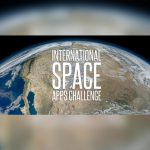It is already a reality in North America. As part of the NewSpace movement, many young startup companies bring innovative ideas to the space sector and with those innovative ideas come advancements in this interesting and promising sector. “This topic has not reached Europe yet.”, says Sebastian D. Marcu. But the CEO of Cologne-based, Design & Data, is sure that “within the next months and years something great will happen here”. The movement has started successfully with the first StartupWeekend Space in Bremen for which the communications expert acted as co-lead.
In mid-April the event united 80 participants from 18 countries in the Bremen “Innovations- und Technologiezentrum” BITZ. Within a 60-hour timeframe, creative minds from various backgrounds developed new startup concepts for the space sector.
Twenty-seven business ideas were pitched to the audience during the first round. Every candidate had 60 seconds for their presentations. During this time they had to present the problem, explain the potential solution, and discuss what resources would be required. After the presentation a poster with the team name and main business ideas was created to help with the visualization of each individual pitch. Following the completion of the pitches, all 80 participants had the opportunity to vote for their personal favorites by placing stickers on the posters.
The participants who pitched the ten business ideas with the most stickers became team leaders and could then recruit their team members out of the remaining participants. For the remainder of the weekend the selected ideas were designed, developed, and continuously revised to create optimum business cases.
There was a unique ambience during the entire event. A very creative and productive atmosphere was born within the teams and due to the international and interdisciplinary nature of each team, the basic ideas quickly became more mature. As Kai Krieger from the team Art for Space said: “It is astonishing to see and feel this spirit”.
With some teams consisting of more than a dozen members, group dynamics quickly became very complex. In return, some had to learn that working with multiple individuals can also create conflicts. A difference in opinion within one group led to several members splitting off. These members later founded the team number eleven called Mapeye.
While refining their business models, the groups received professional support from representatives of renowned space companies and established mentors from industry. This group of mentors consisted of CEOs, highly qualified financial experts, and experienced project managers. These mentors helped the teams to turn their ideas into feasable and solid business concepts.
The groups worked meticulously – even overnight in some cases. During the course of the weekend, teams developed interactive websites, operational software, and even physical prototypes. These prototypes were created using 3D printers and laser cutters provided by the near-by located FabLab.
Everyone had the feeling that something special is happening here. Mihir Bhagat from team Beyond noted after a short night: “It is very exciting and tiring. What is driving us is that we are having a lot of fun”.
On the last day, all of the eleven business cases were presented to a jury of experts. After the presentations the judges convened and selected three winning teams. The winning team, USB-i, developed the idea of an universal adapter which connects various payloads with satellite busses. USB-i, the 2nd, and 3rd finishing teams received prizes such as professional coaching to help further develop their business models.
At the end of the event the winners, other participants and organizers all shared the same idea: that the event was a terrific experience!
“The feedback from all participants was positive in every respect” summarized Sebastian Marcu, who according to him felt to be in a “creative world like Silicon Valley”. The cultural backgrounds of the participants as well as the fact that not just aerospace engineers attended, but also people from different fields such as design and economics contributed to the success of this event. Hans-Georg Tschupke, head of the innovation at Bremen Invest, said: “My overall impression of the first StartupWeekend Space in Europe was: Exciting!”
It is evident that in the space sector a vast diversity of potential exists that needs to be tapped into and extracted. Everybody who understands this, agrees that Bremen is the ideal location to unlock this potential in Europe.
“We want to make Bremen the hub for young entrepreneurs in space”, announced Hans-Georg Tschupke. “There are already discussions ongoing with national and international parties – StartupWeekend Space was just the beginning.
It will be exciting to see what will come next. Something new and strong will grow and accelerate the entire European space community. Something fantastic will prosper in Bremen, and everyone can be a part of it.
The motto is: Think big, be bold, #BeSpacial!
Source: http://en.designdata.de/News/NewSpace-Ideas-for-Europe

